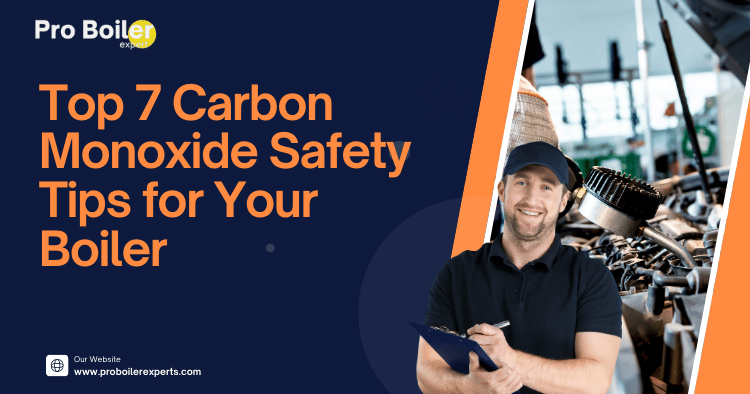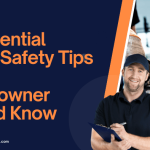Table of Contents
- What is Carbon Monoxide?
- Understanding the Risks of Carbon Monoxide
- Tip 1: Install a Carbon Monoxide Detector
- Tip 2: Regular Boiler Maintenance
- Tip 3: Ventilation is Key
- Tip 4: Know the Signs of Carbon Monoxide Poisoning
- Tip 5: Educate Your Family
- Tip 6: Seek Professional Help
- Tip 7: Create an Emergency Plan
- FAQs About Carbon Monoxide Safety
- Conclusion
What is Carbon Monoxide?
Carbon monoxide (CO) is a colorless, odorless gas produced during the incomplete combustion of fossil fuels. Common sources include gas appliances, engines, and heaters. Because CO is undetectable by human senses, it poses a significant safety risk, particularly in enclosed spaces like homes. Understanding this gas is the first step towards ensuring your safety.
“Carbon monoxide is known as the ‘silent killer’ due to its stealthy nature.”
Understanding the Risks of Carbon Monoxide
Carbon monoxide can be lethal. It binds to hemoglobin in your blood more effectively than oxygen, leading to suffocation in high concentrations. Symptoms of CO poisoning include headaches, dizziness, weakness, nausea, and confusion. In severe cases, it can lead to unconsciousness or even death.
| CO Levels | Symptoms |
|---|---|
| 35 ppm | Headache, fatigue |
| 150 ppm | Dizziness, nausea |
| 400 ppm | Life-threatening after 3 hours |
| 800 ppm | Loss of consciousness within 30 minutes |
For more information on carbon monoxide and its effects, visit the CDC’s carbon monoxide page.
“Understanding the symptoms associated with CO exposure can be lifesaving.”
Tip 1: Install a Carbon Monoxide Detector
The first line of defense against carbon monoxide poisoning is a reliable CO detector. Place detectors on every level of your home, especially near sleeping areas. Test them monthly to ensure they’re working correctly, and replace batteries at least once a year. If your detector goes off, evacuate immediately and call emergency services. For comprehensive guidance on boiler safety, check out the Top 5 Smart Boilers Revolutionizing Home Heating.
“A functioning CO detector can be the difference between life and death.”
Tip 2: Regular Boiler Maintenance
A well-maintained boiler is crucial for preventing carbon monoxide leaks. Schedule annual professional inspections to ensure that your boiler is functioning efficiently. Technicians will check for signs of wear, corrosion, or blockage in vents, which can lead to dangerous CO buildup. Keeping your boiler in tip-top shape not only extends its life but also safeguards your family. Learn more in our article on Top 5 Benefits of Choosing Combi Boilers for Your Home.
“Regular maintenance is key to preventing potential hazards.”
Tip 3: Ventilation is Key
Proper ventilation is essential for any combustion appliance, including your boiler. Ensure that vents aren’t blocked by furniture or debris. If your boiler is in a confined space, like a utility room, consider installing additional ventilation to allow fresh air to circulate. This reduces the risk of carbon monoxide accumulating to dangerous levels. For insights on boiler types that offer efficient heating, see our guide on Top 5 Gas Boilers for Efficient Home Heating 2024.
“Good ventilation can prevent CO build-up and ensure safe operation.”
Tip 4: Know the Signs of Carbon Monoxide Poisoning
Familiarizing yourself with the symptoms of CO poisoning can save lives. Early signs include:
- Headache
- Dizziness
- Shortness of breath
- Nausea
If you or someone in your household exhibits these symptoms after using the boiler, leave the area immediately and seek fresh air. Call for medical help if symptoms persist. Understanding the importance of boiler efficiency can help, as seen in Top 5 Benefits of Condensing Boilers You Should Know.
“Recognizing symptoms early can lead to quicker recovery.”
Tip 5: Educate Your Family
Make sure everyone in your household understands the dangers of carbon monoxide. Discuss the importance of CO detectors, the symptoms of poisoning, and what to do in an emergency. Regular family meetings can help reinforce these safety guidelines and ensure everyone is prepared. Explore more about maintaining an efficient boiler in our article on Essential Boiler Maintenance Tips to Keep Your System Efficient.
“Knowledge is power—ensure your family is informed.”
Tip 6: Seek Professional Help
If you suspect any issues with your boiler, don’t hesitate to contact a professional. Ignoring potential problems can lead to serious safety hazards. Professionals can identify issues you might overlook and ensure your boiler operates safely and efficiently. For tips on choosing the right boiler installer, check out Top 5 Tips for Choosing the Right Boiler Installer.
“Don’t take chances—call the experts when in doubt.”
Tip 7: Create an Emergency Plan
Have a clear plan in case of carbon monoxide exposure. Make sure everyone knows how to respond if a CO detector alarms or if someone shows symptoms of poisoning. Your plan should include:
- Immediate evacuation procedures
- Contact information for emergency services
- A designated meeting point away from the house
Planning ahead can make a significant difference in an emergency situation. Additionally, consider the importance of knowing boiler safety regulations. For more information, refer to Top Gas Safety Regulations for Boiler Installation 2024.
“Being prepared can save lives—make your emergency plan today.”
FAQs About Carbon Monoxide Safety
Q: How often should I replace my carbon monoxide detector?
A: CO detectors have a lifespan of about 5 to 7 years. Check the manufacturer’s instructions for specifics.
Q: Can I use a gas appliance if the CO detector is alarming?
A: No. If your CO detector alarms, leave the area immediately and call emergency services for assistance.
Q: Is it safe to use a boiler during a power outage?
A: This depends on the type of boiler. Gas boilers can usually function without electricity, but ensure proper ventilation and monitor CO levels.
“Stay updated on safety practices—your awareness is crucial.”
Conclusion
Carbon monoxide safety shouldn’t be taken lightly, especially in homes with gas appliances like boilers. By following these seven tips, you can significantly reduce the risk of carbon monoxide poisoning and keep your family safe. For further reading on CO safety, check out the National Fire Protection Association.
Stay informed, stay safe, and remember: prevention is always better than cure when it comes to carbon monoxide.
“Your safety is paramount—make these tips a priority.”





